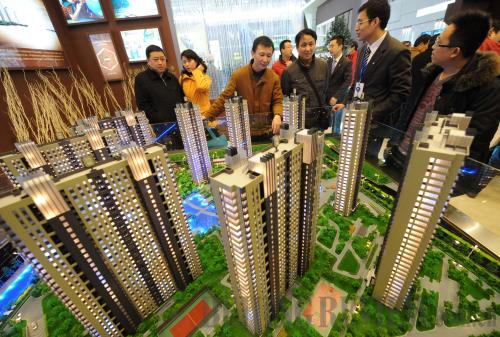|
Defiant market
 |
|
REAL ESTATE RUSH: Homebuyers look at building models from a property developer at the 2010 Nanjing Real Estate Fair on April 1 (SUN CAN) |
The market so far seems to be turning a deaf ear to regulators' calls. Data from the Shenzhen-headquartered Guotai Jun'an Securities Co. Ltd. showed house sales all over the country increased between March 26 and April 2. Big cities even experienced a 64-percent jump in prices during the week while second-tier cities saw their prices rise 36 percent.
"We are shocked at how bullish the market is," said Sun Jianping, a senior analyst with Guotai Jun'an.
Beijing was among the most vibrant markets—sales of used houses in the city exceeded 20,000 units in March with average prices increasing 10 percent from the previous month, said a report by the Beijing Real Estate Agency Association.
Chen Guoqiang, Director of the Research Institute of Real Estate at Peking University, attributed the housing boom in part to the government's monetary policy that remained relatively easy and was exploited by investors and developers.
"Investors are pouring into the market to seek protection against expected inflation," he said. "The cash-swash property developers also have little financial incentive to lower prices."
Bubbles confirmed
So are bubbles really blowing up in Chinese cities? A recent MLR report said yes.
The report cited the rent-to-price ratio, usually an effective barometer of property market health, as a cause for alarm. Analysts read a ratio under 4.5 percent as a sign of the existence of property bubbles and that above 5.5 percent for under-valuation.
The ratio for Beijing was 3.81 percent in 2009, comparable to most other big cities in the country, said the report.
Worse still, rumors are swirling around that China may follow Japan and suffer a serious property crash. Resembling Japan's experience with house prices, China's property market has gone on a roller-caster ride in the past few years, igniting fears that a housing bust may occur next year.
But property developers have downplayed the risks. "China's house prices are bound for an upward spiral in the future on buoyant demands and short supplies," said Ren Zhiqiang, President of Beijing Huayuan Property Co. Ltd., on his blog.
Urban households are increasing by more than 11 million annually while the market can supply only 5 million apartments every year, he said.
The urbanization process is picking up, putting a solid floor under the housing market, said Ren.
For China to have an urbanization rate equal to that of developed countries, it would need to build homes for 400 million farmers. Such an enormous demand will surely keep the property boom alive for at least 10 years, he added.
Financial regulators have stayed up-to-date and fully aware of the financial risks stemming from the property market.
The CBRC has been keeping a watchful eye over frothy asset prices, CBRC Minister Liu Mingkang said at the 5th London School of Economics and Political Science Asian Forum held on March 26 in Beijing.
Liu added the commission would take three steps to fend off mortgage risks, including raising the threshold of mortgages, monitoring how loans are used and stepping up controls over credit to property developers.
Tang Min, Deputy Secretary-General of the China Development Research Foundation, suggested the government set up an index to monitor house prices and provide justification for swift adjustments in interest rates or land supplies. This would keep house prices within a reasonable range, he said.
| 